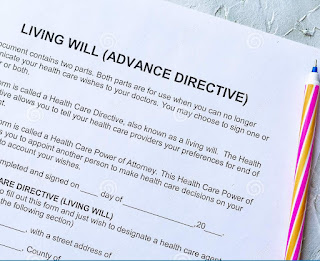An Advance Directive (AD) or a Living Will is a document that states what kind of treatment may or may not be administered to an individual should they be in a situation where they are unable to express their wishes.
Many people do not like the idea of being confined to a hospital bed and receive aggressive treatments in a cold, unfamiliar environment. Spending one's last days hooked to all kinds of machines is not what many people would want. The treatments administered in this period can also be very aggressive and uncomfortable, often resulting in immense suffering. While the chance of surviving ICU stay might be high for younger, relatively healthier individuals, for those already suffering from a chronic condition, the question to be answered is - at what cost do you want every attempt to live to be made?
An AD clearly specifies what interventions should be done and not done. Things like connecting to a ventilator, administering of antibiotics, oxygen support and so on are part of this list of interventions. A blanket directive that no treatment that prolongs life should be given may be specified instead as well.
India lagged behind much of the developed world in this respect. The Supreme Court, in a landmark judgement in 2018 allowed Passive Euthanasia which meant people should be allowed to withdraw from treatment if they have prepared a Living Will (or an AD).
Trouble is the process laid down for registering a Living Will is so arduous, it is as good as not being there because hardly anyone in a situation where they may decide they need a Living Will (people suffering from a Chronic Disease) will be able to do it. Even if they manage to do it, the process to get it implemented is even worse than the process to register it. Very few will put in the effort.
This link has an excellent description of the steps to register a Living Will and implementing it. One cursory look at this page will tell you how impractical the entire process is. While the matter is a sensitive one, a balance needs to be struck between safety from misuse and practicality of implementation.
The current rules make sure that almost no one will ever register their ADs and those who get them register will not get to use them.
The Right to Die with Dignity, as per the Supreme Court is a Fundamental Right and while the court must be lauded for taking this view, steps must be taken to make it practical to implement this.
Thankfully, such a framework that enables this balance has already been drawn up by a group of experts at Vidhi, a legal think-tank. This framework is not onerous and also suggest the necessary safeguards that will prevent misuse. Vidhi now plans to reach out to lawmakers to pass a law in Parliament and State Legislatures to replace the current guidelines.
How much time that will take is anybody's guess. But at least a beginning has been made.

Comments
Usha Balu.